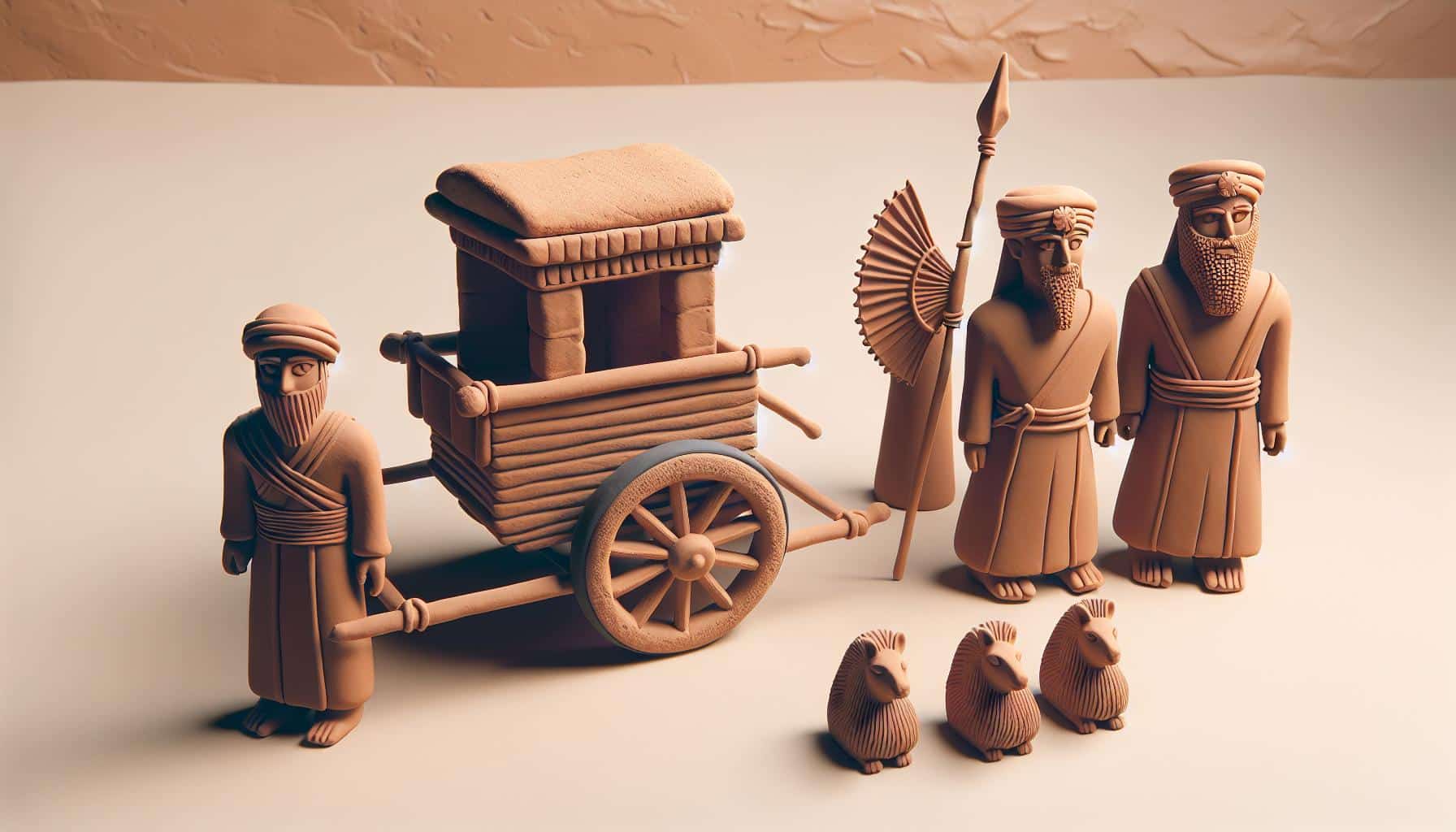Have you ever wondered about the ancient innovations that laid the foundation for modern technology? Mesopotamia, often referred to as the “cradle of civilization,” was a hub of groundbreaking inventions that revolutionized human progress. From the invention of writing systems like cuneiform to the development of the wheel, the Mesopotamians were pioneers in various fields that shaped the course of history.
Imagine a world without the wheel or the concept of time measured in hours and minutes. Mesopotamian inventions not only improved daily life but also paved the way for advancements in agriculture, architecture, and governance. Delving into the origins of these innovations offers a fascinating glimpse into the ingenuity and resourcefulness of ancient civilizations. In this article, we’ll explore some of the most significant Mesopotamian inventions that continue to impact our lives today.
Mesopotamian Invention: A Historical Overview
Delve into the prehistoric ingenuity of Mesopotamia with the mesmerizing inventions that paved the way for modern advancements. The ancient engineers of Mesopotamia were trailblazers in technological innovations that shaped civilizations.
- Sumerian Technological Advancements
Explore the Sumerian legacy of pioneering inventions, revolutionizing early societies with their advanced engineering marvels. Mesopotamian inventions were uniquely crafted to elevate the quality of life for ancient communities. - Origins of the Wheel
Uncover the origins of the wheel in Mesopotamia, a treasure trove of technological breakthroughs that supercharged the efficiency of prehistoric transportation. Mesopotamian wheel developments laid the foundation for the evolution of wheeled vehicles. - Mesopotamian Wheel Development
Mesopotamian innovations in wheel technology were unparalleled, shedding light on the evolution of ancient means of transportation. The Mesopotamian pottery wheels were uniquely designed to enhance productivity in various industries. - Ancient Wheeled Warfare
Witness the ancient wheeled warfare strategies that revolutionized military tactics in Mesopotamia. The symbolism associated with the Mesopotamian wheel highlighted its strategic importance in ancient battles. - Wheel’s Impact on Ancient Civilizations
The Mesopotamian wheel’s diffusion across ancient civilizations like Egypt reshaped trade routes and cultural exchanges. Egyptian adaptations of the wheel further exemplified its significance in the evolution of ancient societies. - Mesopotamian Wheel Archaeology
Archaeological findings provide glimpses into Mesopotamian wheel materials and their role in trade networks, unlocking the secrets of ancient economic systems. The Mesopotamian wheel stood as a symbol of progress and connectivity in the ancient era.
Embark on a journey through the Mesopotamian landscape of innovation and witness how the wheel, among other inventions, played a pivotal role in shaping the course of ancient civilizations.
The Influence of Mesopotamian Inventions on Global Civilization

Exploring Mesopotamian Inventions can provide valuable insights into the development of early civilizations and their impact on the world. Mesopotamia, known for its innovative spirit, created technological advancements that significantly influenced global civilization. Let’s look at how these inventions shaped the course of history:
Mesopotamian Wheel Development
Mesopotamia is credited with the origins of the wheel, a pivotal invention that revolutionized transportation and trade. The earliest wheeled vehicles found in Mesopotamia date back to around 3500 BC. The Sumerians, known for their technological achievements, used the wheel in various aspects of daily life, including pottery making and transportation.
Mesopotamian Wheel Symbolism
Beyond its practical applications, the wheel held symbolic significance in Mesopotamian culture. It represented progress, connectivity, and unity among civilizations. The diffusion of the wheel to other regions, such as Egypt, played a crucial role in shaping ancient trade networks and warfare strategies.
Wheel’s Impact on Ancient Civilizations
The introduction of the wheel had a profound impact on ancient civilizations like Egypt. The adoption of wheeled vehicles, such as chariots, revolutionized warfare tactics and trade routes. Egyptian adaptations of the wheel further demonstrated the interconnectedness of cultures through technological exchange.
Mesopotamian Wheel Archaeology
Archaeological excavations have uncovered evidence of Mesopotamian wheel innovations, providing insights into ancient engineering marvels. The discovery of ancient wheel materials and artifacts in Mesopotamia sheds light on the craftsmanship and ingenuity of early societies.
Wheel’s Role in Ancient Trade
The wheel’s role in ancient trade cannot be understated. It facilitated the movement of goods, fostered cultural exchange, and contributed to the growth of economic systems in Mesopotamia and beyond. The efficient transportation enabled by the wheel laid the foundation for cross-regional commerce and societal development.
By delving into Mesopotamian inventions, particularly the development and symbolism of the wheel, you gain a deeper appreciation for the technological achievements that continue to influence global civilization. The legacy of Mesopotamian innovations serves as a testament to the ingenuity and lasting impact of early civilizations on the modern world.
Cultural Impacts of Mesopotamian Inventions
Mesopotamian inventions, such as the development of the wheel, had profound cultural impacts that reverberated throughout ancient civilizations. Let’s delve into the cultural implications of Mesopotamian innovations and how they shaped early societies.
Influence on Ancient Trade Networks
- Mesopotamian inventions, including the wheel, played a pivotal role in ancient trade networks.
- Through the efficient transportation of goods and materials, the wheel facilitated the expansion of trade routes.
- Ancient Wheel Materials like wood and metal were key components in crafting durable, functional wheels for trade caravans.
Symbolic Representation of Progress and Unity
- The wheel symbolized progress, unity, and interconnectedness among different Mesopotamian city-states.
- Mesopotamian Wheel Symbolism reflected the idea of constant motion and advancement in society.
- It represented the interconnected nature of trade and cultural exchange in the region.
Impact on Ancient Warfare Strategies
- The introduction of wheeled vehicles revolutionized ancient warfare strategies in Mesopotamia.
- Ancient Wheeled Warfare techniques, including chariots and war chariots, transformed military tactics and battles.
- The use of wheeled transport in warfare enhanced mobility and combat effectiveness.
Contribution to Cultural Exchange
- The diffusion of Mesopotamian inventions, such as the wheel, fostered cultural exchange and interactions between civilizations.
- Mesopotamian Wheel Diffusion across regions facilitated the transfer of knowledge and technological advancements.
- It paved the way for cross-regional commerce and the sharing of ideas and practices.
- The cultural impacts of Mesopotamian inventions, particularly the wheel, left an enduring legacy on ancient civilizations.
- The wheel’s role in shaping economic systems, warfare, and trade underscored its significance in cultural development.
- Mesopotamian Wheel Innovations influenced subsequent technological advancements and the progression of society.
By understanding the cultural impacts of Mesopotamian inventions, you gain insight into the profound influence these innovations had on shaping early societies and laying the foundation for future technological progress.
Legacy of Mesopotamian Inventions in Modern Society
Mesopotamian inventions have left an indelible mark on modern society, with their influence spanning various aspects of contemporary life.
Technological Advancements and Innovation
Mesopotamian Invention: The origins of the wheel and other prehistoric transportation technologies developed by the ancient Mesopotamians revolutionized the way goods and people were transported.
Modern Application: Today, the principles of these ancient engineering marvels are still reflected in the design of modern vehicles and transportation systems, showcasing the enduring legacy of Sumerian technological advancements.
Cultural Significance and Symbolism
Mesopotamian Innovation: The symbolic representation of progress and unity through the wheel in Mesopotamian culture highlighted the significance of interconnectedness and advancement.
Modern Implications: In contemporary society, the symbolism of unity and progress continues to resonate, emphasizing the importance of innovation and connectivity in a competitive digital world.
Impact on Trade and Commerce
Mesopotamian Development: The introduction of the wheel played a crucial role in facilitating ancient trade networks by providing a more efficient means of transportation for goods and commodities.
Modern Influence: The legacy of Mesopotamian wheel innovations can be seen in the global trade landscape, where efficient transportation remains a cornerstone of cross-regional commerce.
Evolution of Warfare Strategies
Ancient Adaptations: The utilization of wheeled vehicles in ancient warfare by Mesopotamian and Egyptian civilizations transformed military tactics and battle strategies.
Modern Reflection: The influence of ancient wheeled warfare tactics can still be observed in contemporary military technology and strategic maneuvers, underscoring the enduring impact of Mesopotamian innovations on warfare.
The legacy of Mesopotamian inventions continues to shape and inspire modern society, showcasing the timeless relevance of ancient technological, cultural, and societal advancements.
Conclusion
Mesopotamian inventions have left an indelible mark on global civilization, shaping not only ancient trade networks and warfare strategies but also influencing modern technology and society. The wheel, in particular, stands out as a symbol of progress and unity, resonating through the ages to impact contemporary transportation systems and commerce. The cultural significance of Mesopotamian innovations continues to inspire various aspects of modern life, showcasing the enduring legacy of ancient advancements. As we reflect on the historical significance of Mesopotamian inventions, we are reminded of their timeless relevance and the profound impact they have had on shaping the world we live in today.
Frequently Asked Questions
What are the key topics covered in the article?
The article explores Mesopotamian inventions, with a focus on the historical significance of the wheel, its impact on global civilization, cultural implications, influence on ancient trade networks, symbolism of progress and unity, impact on ancient warfare strategies, legacy in modern society, technological advancements in transportation, and cultural significance of the wheel.
How do Mesopotamian inventions influence modern society?
Mesopotamian inventions, particularly the wheel, continue to influence modern society through advancements in transportation, symbolism of progress and unity, impact on trade networks, and legacy in warfare strategies. Their technological innovations have shaped modern vehicles and systems, while their cultural significance remains relevant in contemporary society.
What is the lasting impact of Mesopotamian wheeled vehicles on modern military technology?
Mesopotamian wheeled vehicles have had a lasting impact on modern military technology and tactics, influencing the evolution of warfare strategies. Their innovations in transportation and military applications have shaped and continue to inspire modern military technology, highlighting the enduring legacy of Mesopotamian inventions in modern warfare.
